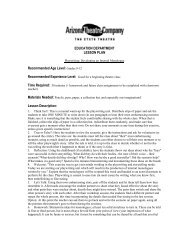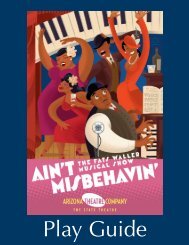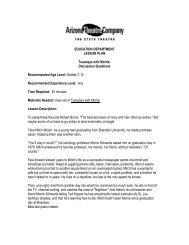Play Guide [1.2MB PDF] - Arizona Theatre Company
Play Guide [1.2MB PDF] - Arizona Theatre Company
Play Guide [1.2MB PDF] - Arizona Theatre Company
Create successful ePaper yourself
Turn your PDF publications into a flip-book with our unique Google optimized e-Paper software.
DEFENSE<br />
IN DEFENSE OF THE MATRIARCH<br />
In literature, mythology, and drama, one can easily identify the traits of the archetypal<br />
mother. She is sweet, kind, loving and loyal, devoting all of her energy to the well-being<br />
of her husband and family. Indeed, the virtues of these matriarchal characters are often<br />
exaggerated to the point that real-life women cannot possibly measure up. Therefore, it<br />
may surprise audiences that Amanda, the matriarch in Tennessee Williams’ The Glass<br />
Menagerie, is anything but perfect. Based upon Williams’s own mother Edwina, Amanda<br />
embodies what can happen when a mother’s wish for her family’s happiness goes too far<br />
and ventures into the realm of fantasy.<br />
Some viewers perceive that<br />
Amanda lives in a world of<br />
her imagination, choosing<br />
to remember an idealized<br />
past rather than face grim<br />
realities. Others perceive that<br />
she has an acute sense of<br />
reality she uses to create an optimism that is false. Either<br />
way, since her husband has abandoned her to raise two<br />
children alone in a time period when a woman on her own<br />
would have been in a precarious position, her situation is<br />
bleak. However, Amanda succeeds in keeping her family<br />
afl oat through sheer force of will by exerting control on<br />
her remaining family members. She wants what is best<br />
for them, which is shown by her worrying that Tom’s late<br />
night activities may endanger his job and signing Laura up<br />
for a secretarial course. Both actions are symptoms of her<br />
desire to see Tom and Laura well-placed. However, her<br />
controlling nature takes a toll on her relationships with<br />
her now-adult children. Amanda’s motherly concern and<br />
eternal optimism for Laura’s prospective suitors end up<br />
coming across as overbearing, unwittingly insensitive, and<br />
The strongest infl uences in my life and my work<br />
are always whomever I love. Whomever I love<br />
and am with most of the time, or whomever I<br />
remember most vividly. I think that's true of<br />
everyone, don't you? – Tennessee Williams<br />
Costume Design for Amanda<br />
by designer Emily Pepper<br />
at times even delusional. Amanda means well, but the best of intentions can have the<br />
worst consequences. Her love smothers her children and the safe haven she attempts<br />
to create for them actually oppresses them both, leaving Laura and Tom both longing to<br />
escape.<br />
- written by Alicia James, dramaturgical intern<br />
The Glass Menagerie<br />
<strong>Arizona</strong> <strong>Theatre</strong> <strong>Company</strong> <strong>Play</strong> <strong>Guide</strong> 15


![Play Guide [1.2MB PDF] - Arizona Theatre Company](https://img.yumpu.com/11952176/15/500x640/play-guide-12mb-pdf-arizona-theatre-company.jpg)
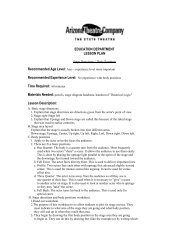

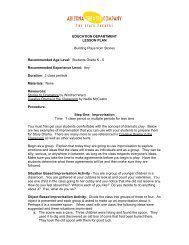

![Play Guide [356k PDF] - Arizona Theatre Company](https://img.yumpu.com/46218320/1/190x245/play-guide-356k-pdf-arizona-theatre-company.jpg?quality=85)
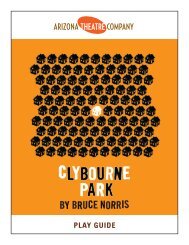
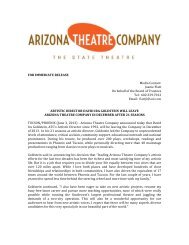
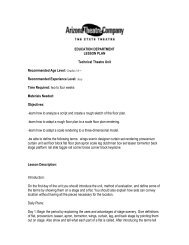

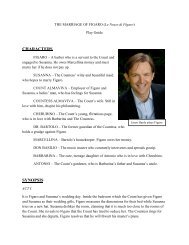
![[title of show] Arizona Theatre Company Play Guide 1](https://img.yumpu.com/24482689/1/190x245/title-of-show-arizona-theatre-company-play-guide-1.jpg?quality=85)
